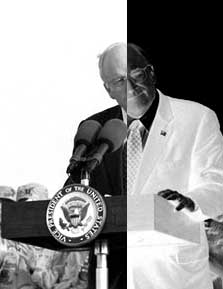|
Related : Conflict of Interest in the Iraq War : The Bush 100, Center for Public Integrity : The Defense Policy Board and Defense Contractors, Center for Public Integrity : Corporations That Supplied Iraq's Weapons Program, Die Tageszeitung : Cheney & Halliburton: Go Where the Oil Is, Multinational Monitor : U.S. Firms Aiding Iraqi Oil Industry, WP : Doing Business with Iraq Discreetly, FT : In Iraqi War Scenario, Oil Is Key, WP : Straw Admits Oil is Key Priority, Guardian |
LIES | THRIVES | ACT | CONTACT
..:: lies about the future of iraq The State Department has a taskforce called the Future of Iraq Group to broker the post-war future of Iraq. In September, 2002, State Department officials claimed that the task force did not have oil on its list of issues. In April, 2003, the Future of Iraq Group's oil and energy working group brokered a deal between Iraqi exiles and senior US officials to have international oil companies take a leading post-war role in reviving Iraq's oil industry. The group decided that Iraq should remain within OPEC but not restrict itself to OPEC's quotas until it sells all the oil that it was not permitted to sell during the sanctions years. The participants also discussed the restructuring and partial privatization of Iraq's State Oil Marketing Organisation. On October 30, 2002, White House spokesman Ari Fleischer said, "The only interest the United States has in the region is furthering the cause of peace and stability. We are not interested in Saddam Hussein's country's ability to generate oil... That's not the way America works." In October, 2002, the State Department was developing a schedule for meetings with Iraqi opposition leaders on the rehabilitation of the Iraqi petroleum sector, Iraq's OPEC membership and surpassing OPEC's quotas, and honoring contracts Saddam's contracts with foreign oil companies. ..:: Cheney's Lies About Halliburton's Deals with Iraq Dick Cheney was Secretary of Defense from 1989 to 1993, and was in charge of defense during the the Gulf War. In 1995, having left office, he became Chief Executive Officer of Halliburton Energy Corp.. Dick Cheney claimed in a July 30, 2000, interview on ABC's "This Week," that while he was head of Halliburton, neither Halliburton nor its subsidiaries traded with Iraq. "I had a firm policy that we wouldn't do anything in Iraq, even arrangements that were supposedly legal," he said. "We've not done any business in Iraq since U.N. sanctions were imposed on Iraq in 1990, and I had a standing policy that I wouldn't do that." However, a Halliburton spokesman acknowledged that two Halliburton subsidiaries, Dresser Rand and Ingersoll Dresser Pump, had in fact (legally) traded with Iraq. Cheney revised his statement on the same program three weeks later. Cheney said he was unaware that these subsidiaries were doing business with the Iraq when Halliburton purchased them in September 1998, and that Halliburton divested themselves of these subsidiaries. The divestiture of the subsidiaries took place in late 1999 and early 2000, more than a year after acquisition. Under Cheney, these subsidiaries signed contracts to sell more than $73 million in oil production equipment and spare parts to Iraq, and it is highly unlikely that he would not have known of their Iraqi deals. On becoming Vice President, Cheney appointed a commission on energy policy whose 2001 report recommended that the United States "conduct an immediate policy review toward Iraq" that includes "military... assessments." |



